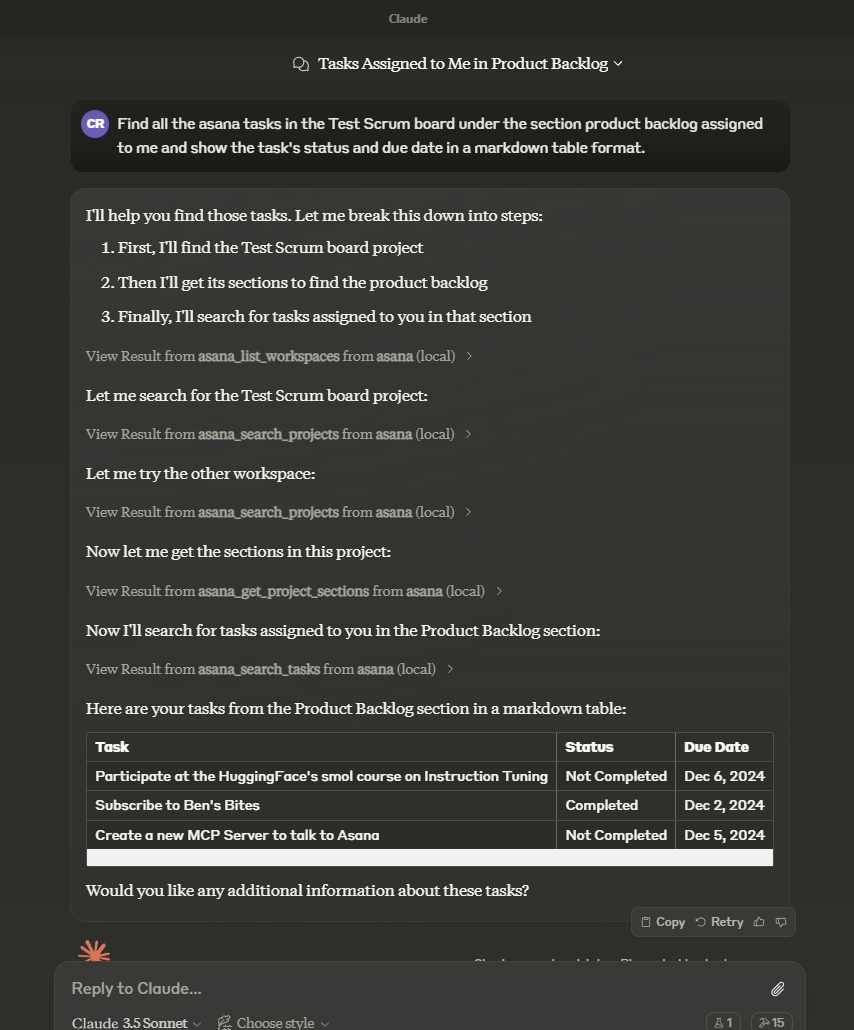About
An MCP server that lets you query and manipulate Asana tasks, projects, workspaces, and comments from LLM clients like Claude Desktop. It provides convenient tools for listing workspaces, searching projects, and updating tasks with custom fields.
Capabilities

Overview of the MCP Server for Asana
The MCP Server for Asana bridges the gap between AI assistants and Asana’s robust project‑management API. By exposing a set of well‑defined tools, it lets conversational agents such as Claude Desktop ask natural‑language questions about tasks, projects, workspaces, and comments—and receive precise, actionable data without leaving the chat. This eliminates the need for developers to write custom integration code or manage authentication flows manually, streamlining workflow automation and data retrieval directly within the AI interface.
At its core, the server implements a collection of MCP tools that mirror common Asana operations. For example, retrieves every workspace the authenticated user can access, while allows pattern‑based discovery of projects across a workspace or team. These tools return structured JSON payloads that the LLM can parse and embed in responses, enabling seamless context transfer. The server also supports advanced custom‑field manipulation; developers can update enum, text, number, or date fields by passing the correct field GIDs and values, simplifying tasks that would otherwise require multiple API calls.
Developers benefit from a clear separation of concerns: the MCP server handles all Asana communication, authentication, and pagination, while the AI client focuses on intent recognition and response generation. This architecture supports real‑world scenarios such as sprint planning, where a user can ask, “How many unfinished Asana tasks do we have in Sprint 30?” and receive an up‑to‑date count instantly. It also enables dynamic task creation or updates, allowing teams to adjust priorities on the fly from within a chat session.
Unique advantages of this server include its explicit support for custom fields—a feature often overlooked in generic integrations. By providing a concise syntax for setting enum options, dates, and multi‑enum arrays, it empowers users to maintain rich metadata without leaving the conversational context. Additionally, the server respects a configuration, reducing unnecessary API calls and speeding up responses for teams that operate within a single workspace.
In summary, the MCP Server for Asana offers developers a plug‑and‑play solution to embed Asana data into AI workflows. It delivers ready‑made tools for querying and updating tasks, projects, and workspaces, while handling the intricacies of authentication and pagination. The result is a powerful, low‑overhead integration that turns an AI assistant into a fully capable project‑management companion.
Related Servers
Netdata
Real‑time infrastructure monitoring for every metric, every second.
Awesome MCP Servers
Curated list of production-ready Model Context Protocol servers
JumpServer
Browser‑based, open‑source privileged access management
OpenTofu
Infrastructure as Code for secure, efficient cloud management
FastAPI-MCP
Expose FastAPI endpoints as MCP tools with built‑in auth
Pipedream MCP Server
Event‑driven integration platform for developers
Weekly Views
Server Health
Information
Explore More Servers
Omeka S MCP Sample
Integrate Omeka S with Claude Desktop via MCP
Payman Documentation MCP Server
Instantly access Payman AI docs for smarter assistant responses
MCP Learning Project
Simple arithmetic MCP server with SSE and stdio support
Volatility MCP Server
AI‑powered memory forensics via RESTful APIs
kill-process-mcp
MCP Server: kill-process-mcp
Geolocation MCP Server
Fetch walkability, transit, and bike scores for any location